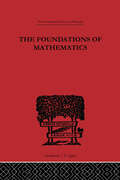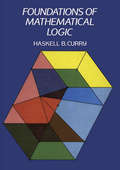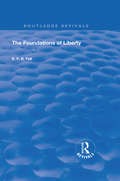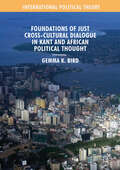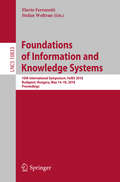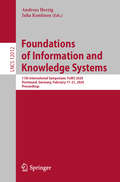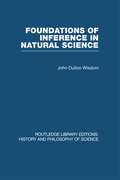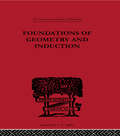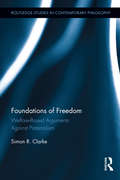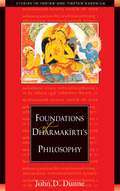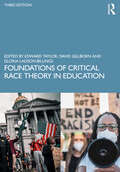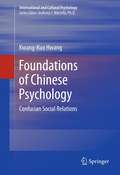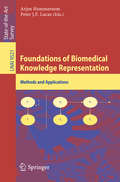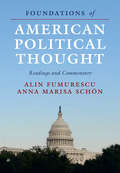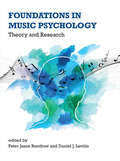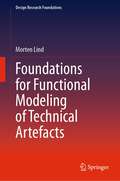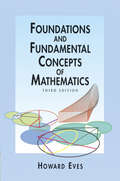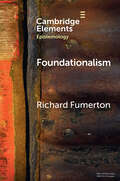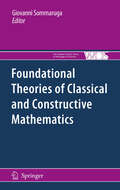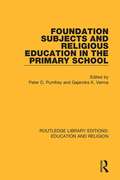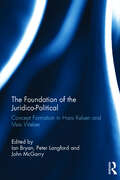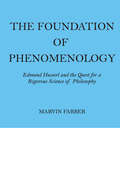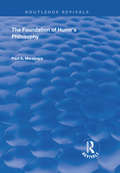- Table View
- List View
Foundations of Mathematics and other Logical Essays (International Library of Philosophy)
by Frank Plumpton RamseyThis is Volume V in a series of eight on the Philosophy of Logic and Mathematics. Originally published in 1931, this study offers a collection of logical essays around the topic of the foundations of mathematics. Though mathematical teaching was Ramsey's profession, philosophy was his vocation. Reared on the logic of Principia Mathematica, he was early to see the importance of Dr. Wittgenstein's work (in the translation of which he assisted); and his own published papers were largely based on this. But the previously unprinted essays and notes collected in this volume show him moving towards a kind of pragmatism, and the general treatise on logic upon which at various times he had been engaged was to have treated truth and knowledge as purely natural phenomena to be explained psychologically without recourse to distinctively logical relations.
Foundations of Mathematical Logic
by Haskell B. CurryThis book is a thoroughly documented and comprehensive account of the constructive theory of the first-order predicate calculus. This is a calculus that is central to modern mathematical logic and important for mathematicians, philosophers, and scientists whose work impinges upon logic.Professor Curry begins by asking a simple question: What is mathematical logic? If we can define logic as "the analysis and criticism of thought" (W. E. Johnson), then mathematical logic is, according to Curry, "a branch of mathematics which has much the same relation to the analysis and criticism of thought as geometry does to the science of space."The first half of the book gives the basic principles and outlines of the field. After a general introduction to the subject, the author discusses formal methods including algorithms and epitheory. A brief treatment of the Markov treatment of algorithms is included here. The elementary facts about lattices and similar algebraic systems are then covered. In the second half of the book Curry investigates the possibility for a formulation that expresses the meaning to be attached to the logical connectives and to develop the properties that follow from the assumptions so motivated. The author covers positive connectives: implication, conjunction, and alternation. He then goes on to negation and quantification, and concludes with modal operations. Extensive use is made in these latter chapters of the work of Gentzen. Lists of exercises are included.Haskell B. Curry, Evan Pugh Research Professor, Emeritus, at Pennsylvania State University, was a member of the Institute for Advanced Study, Princeton; a former Director of the Institute for Foundational Research, the University of Amsterdam; and President of the Association for Symbolic Logic. His book avoids a doctrinaire stance, presenting various interpretations of logical systems, and offers philosophical and reflective as well as mathematical perspectives.
The Foundations of Liberty (Routledge Revivals)
by E. F. FellOriginally published in 1908, this book aims at setting forth liberty, personal and national - not as a mere utility as is usually the case - but as an a priori moral necessity, the sine qua non of all true civilisation.
Foundations of Just Cross-Cultural Dialogue in Kant and African Political Thought (International Political Theory)
by Gemma K. BirdThis book addresses the potential existence of shared foundational principles in the work of Immanuel Kant and a range of African political thought, as well as their suitability in facilitating just and fair cross-cultural dialogue. The book first establishes an analytical framework grounded in a Kantian approach to understanding shared human principles, suggesting that a drive to be self-law giving may underpin all human interactions regardless of cultural background. It then investigates this assumption by carrying out a theoretical analysis of texts and speeches from a variety of African scholarship, ranging from the colonial period to the present day. The analysis, divided into three distinctive chapters covers the Négritude movement, African socialism and post-colonial philosophers, including such thinkers as: Léopold Sédar Sengor, Julius K Nyerere, Kwame Nkrumah, Kwame Anthony Appiah, Kwasi Wiredu and Kwame Gyekye. The author argues that underpinning each of their very different theoretical positions and arguments is a foundational argument for the importance of self-law giving. In doing so she highlights the need to respect this principle when embarking on cross-cultural dialogues. The book will be of interest to students and scholars in the fields of African political thought, political theory and international relations.
Foundations of Information and Knowledge Systems: 10th International Symposium, Foiks 2018, Budapest, Hungary, May 14-18, 2018, Proceedings (Lecture Notes in Computer Science #10833)
by Flavio Ferrarotti Stefan WoltranThis book constitutes the refereed proceedings of the 10th International Symposium on Foundations of Information and Knowledge Systems, FoIKS 2018, held in Budapest, Hungary, in May 2018.The 20 revised full papers presented together with 1 invited talk were carefully reviewed and selected from 40 submissions. The papers address various topics such as big data; database design; dynamics of information; information fusion; integrity and constraint management; intelligent agents; knowledge discovery and information retrieval; knowledge representation, reasoning and planning; logics in databases and AI; mathematical foundations; security in information and knowledge systems; semi-structured data and XML; social computing; the semantic web and knowledge management; and the world wide web.
Foundations of Information and Knowledge Systems: 11th International Symposium, FoIKS 2020, Dortmund, Germany, February 17–21, 2020, Proceedings (Lecture Notes in Computer Science #12012)
by Andreas Herzig Juha KontinenThis book constitutes the refereed proceedings of the 11th International Symposium on Foundations of Information and Knowledge Systems, FoIKS 2020, held in Dortmund, Germany, in February 2020.The 19 revised full papers presented were carefully reviewed and selected from 33 submissions. The papers address various topics such as big data; database design; dynamics of information; information fusion; integrity and constraint management; intelligent agents; knowledge discovery and information retrieval; knowledge representation, reasoning and planning; logics in databases and AI; mathematical foundations; security in information and knowledge systems; semi-structured data and XML; social computing; the semantic web and knowledge management; and the world wide web.
Foundations of Inference in Natural Science (Routledge Library Editions: History & Philosophy of Science)
by John Oulton WisdomOriginally published in 1952. This book is a critical survey of the views of scientific inference that have been developed since the end of World War I. It contains some detailed exposition of ideas – notably of Keynes – that were cryptically put forward, often quoted, but nowhere explained. Part I discusses and illustrates the method of hypothesis. Part II concerns induction. Part III considers aspects of the theory of probability that seem to bear on the problem of induction and Part IV outlines the shape of this problem and its solution take if transformed by the present approach.
Foundations of Geometry and Induction (International Library of Philosophy)
by Jean NicodFirst published in 2000. Routledge is an imprint of Taylor & Francis, an informa company.
Foundations of Freedom: Welfare-Based Arguments Against Paternalism (Routledge Studies in Contemporary Philosophy)
by Simon R. ClarkeWhat makes individual freedom valuable? People have always believed in freedom, have sought it, and have sometimes fought and died for it. The belief that it is something to be valued is widespread. But does this belief have a rational foundation? This book examines answers to these questions that are based on the welfare of the person whose freedom is at stake. There are various conceptions of a worthwhile life, a life that is valuable for the person whose life it is. These conceptions will be examined to see whether they are plausible and what their connection, if any, is to freedom. Are they compelling foundations for freedom? Does freedom make a person’s life better or would his/her welfare be advanced by restricting freedom?
Foundations of Dharmakirti's Philosophy
by John D. DunneThroughout the history of Buddhism, few philosophers have attained the stature of Dharmakirti, the "Lord of Reason" who has influenced virtually every systematic Buddhist thinker since his time. Dharmakirti's renowned works, written in India during the philosophically rich seventh century, argue that the true test of knowledge is its efficacy, and likewise that only the efficacious is knowable and real. Around this central theme is woven an intricate web of interrelated theories concerning perception, reason, language, and the justification of knowledge. Masterfully unpacking these foundations of Dharmakirti's system, John Dunne presents the first major study of the most vexing issues in Dharmakirti's thought within its Indian philosophical context. Lucid and carefully argued, Dunne's work serves both as an introduction to Dharmakirti for students of Buddhism and a groundbreaking resource for scholars of Buddhist thought.
Foundations of Critical Race Theory in Education
by Edward Taylor David Gillborn Gloria Ladson-BillingsCritical Race Theory (CRT) is at the forefront of contemporary discussions about racism and race inequity in education and politics internationally. The emergence of CRT marked a pivotal moment in the history of racial politics within the academy and powerfully influenced the broader conversation about race and racism in the United States and beyond. Comprised of articles by some of the most prominent scholars in the field, this groundbreaking anthology is the first to pull together both the foundational writings and more recent scholarship on the cultural and racial politics of schooling. The collection offers a variety of critical perspectives on race, analysing the causes, consequences and manifestations of race, racism and inequity in schooling. Unique to this updated edition is a variety of contributions by key CRT scholars published within the last five years, including an all-new section addressing the war on CRT that followed the murder of George Floyd and international protests in support of #BlackLivesMatter. Each section concludes with a set of questions and discussion points to further engage with the issues discussed in the readings. This revised edition of a landmark publication documents the progress of the CRT movement and acts to further spur developments in education policy, critical pedagogy and social justice, making it a crucial resource for students and educators alike.
Foundations of Constructive Probability Theory (Encyclopedia of Mathematics and its Applications #177)
by Yuen-Kwok ChanUsing Bishop's work on constructive analysis as a framework, this monograph gives a systematic, detailed and general constructive theory of probability theory and stochastic processes. It is the first extended account of this theory: almost all of the constructive existence and continuity theorems that permeate the book are original. It also contains results and methods hitherto unknown in the constructive and nonconstructive settings. The text features logic only in the common sense and, beyond a certain mathematical maturity, requires no prior training in either constructive mathematics or probability theory. It will thus be accessible and of interest, both to probabilists interested in the foundations of their speciality and to constructive mathematicians who wish to see Bishop's theory applied to a particular field.
Foundations of Comparative Politics
by Kenneth Newton Jan W. Van DethThis student-friendly introduction to the key theories and concepts of comparative politics now provides even broader coverage of the world's democracies, with examples drawn from across the globe. Foundations of Comparative Politics contains a wealth of information, clearly structured and easy to read, with clear definition of Key Terms. It covers all the important themes in the field, including constitutional design and institutions; mass and elite politics; policy-making and implementation; and the future of the state and democracy in a globalising world. A new chapter on studying comparative politics, and new 'What Have We Learned?' and 'Lessons of Comparison' summary sections help students pull together the lessons of each chapter. Combining facts and theory throughout, debate is stimulated through the use of Controversy boxes, and Fact Files and Briefings give students interesting data that illustrates the key issues in the text. Online resources, including MCQs and Powerpoint slides, complete the package.
Foundations of Chinese Psychology
by Kwang-Kuo HwangMainstream psychology emanated from European-American and Judeo-Christian philosophical and scientific traditions. The application of this viewpoint, which embeds colonial and imperialist concepts is less relevant to Asian and other indigenous cultures. Although it has been accepted by non-Western scholars in an attempt to emulate Western scientific practice, the mainstream viewpoint is in a process of transformation to accommodate geographically relevant perspectives. In this light, Foundations of Chinese Psychology, bridges the gap between western and eastern traditions and elaborates on theories based on local phenomena, findings, and experiences by research methods that are contextually appropriate. Using a guiding principle of cultural psychology - 'one mind, many mentalities', this book advocates the balancing of a global psychology concept without sacrificing that of a specific locality and people. It analyzes the basics of Confucionism and compares them to Western ethical thinking, arriving at a series of theories concerning social exchange, face, achievement motivation, organizational behaviors, and conflict resolution. Beyond the specifics of a particular culture, this book exemplifies the act of constructing autonomous social science that may be emulated in other non-Western settings. It also serves as an excellent guide for cross-cultural research as well as a caveat on the limitations of presumptive individualism and exclusionary perspectives.
Foundations of Biomedical Knowledge Representation
by Arjen Hommersom Peter J.F. LucasMedicineand health care are currently faced with a significant rise in theircomplexity. This is partly due to the progress made during the past threedecades in the fundamental biological understanding of the causes of health anddisease at the molecular, (sub)cellular, and organ level. Since the end of the1970s, when knowledge representation and reasoning in the biomedical fieldbecame a separate area of research, huge progress has been made in thedevelopment of methods and tools that are finally able to impact on the waymedicine is being practiced. Eventhough there are huge differences in the techniques and methods used bybiomedical researchers, there is now an increasing tendency to share researchresults in terms of formal knowledge representation methods, such asontologies, statistical models, network models, and mathematical models. Asthere is an urgent need for health-care professionals to make better decisions,computer-based support using this knowledge is now becoming increasingly important. It may also be the only way to integrate research results from the differentparts of the spectrum of biomedical and clinical research. Theaim of this book is to shed light on developments in knowledge representationat different levels of biomedical application, ranging from human biology toclinical guidelines, and using different techniques, from probability theoryand differential equations to logic. The book starts with two introductorychapters followed by 18 contributions organized in the following topicalsections: diagnosis of disease; monitoring of health and disease andconformance; assessment of health and personalization; prediction and prognosisof health and disease; treatment of disease; and recommendations.
Foundations of American Political Thought: Readings and Commentary
by Alin Fumurescu Anna Marisa SchönAmerican political thought was shaped by a unique combination of theoretical influences: republicanism, liberalism, and covenant theology. This reader shows how these influences came together. Organized chronologically from the Puritans' arrival in the New World to the Civil War, each chapter includes carefully selected primary sources and substantial commentary to explain the historical context and significance of the excerpts. A coherent interpretative framework is offered by focusing the analysis on the different assumptions of the people - the republican understanding as a corporate whole and the liberal understanding as a multitude of individuals - that were intertwined during the founding. The book features, for the first time, two chapters on non-American authors, who capture the main tenets of republicanism and liberalism and were widely quoted in the era, as well as excerpts from lesser-known sources, including Puritan covenants, the first state constitutions, and Native American speeches.
Foundations in Music Psychology: Theory and Research (The\mit Press Ser.)
by Peter Jason Rentfrow Daniel J. LevitinA state-of-the-art overview of the latest theory and research in music psychology, written by leaders in the field.This authoritative, landmark volume offers a comprehensive state-of-the-art overview of the latest theory and research in music perception and cognition. Eminent scholars from a range of disciplines, employing a variety of methodologies, describe important findings from core areas of the field, including music cognition, the neuroscience of music, musical performance, and music therapy. The book can be used as a textbook for courses in music cognition, auditory perception, science of music, psychology of music, philosophy of music, and music therapy, and as a reference for researchers, teachers, and musicians. The book's sections cover music perception; music cognition; music, neurobiology, and evolution; musical training, ability, and performance; and musical experience in everyday life. Chapters treat such topics as pitch, rhythm, and timbre; musical expectancy, musicality, musical disorders, and absolute pitch; brain processes involved in music perception, cross-species studies of music cognition, and music across cultures; improvisation, the assessment of musical ability, and singing; and music and emotions, musical preferences, and music therapy.ContributorsFleur Bouwer, Peter Cariani, Laura K. Cirelli, Annabel J. Cohen, Lola L. Cuddy, Shannon de L'Etoile, Jessica A. Grahn, David M. Greenberg, Bruno Gingras, Henkjan Honing, Lorna S. Jakobson, Ji Chul Kim, Stefan Koelsch, Edward W. Large, Miriam Lense, Daniel Levitin, Charles J. Limb, Psyche Loui, Stephen McAdams, Lucy M. McGarry, Malinda J. McPherson, Andrew J. Oxenham, Caroline Palmer, Aniruddh Patel, Eve-Marie Quintin, Peter Jason Rentfrow, Edward Roth, Frank A. Russo, Rebecca Scheurich, Kai Siedenburg, Avital Sternin, Yanan Sun, William F. Thompson, Renee Timmers, Mark Jude Tramo, Sandra E. Trehub, Michael W. Weiss, Marcel Zentner
Foundations for Functional Modeling of Technical Artefacts (Design Research Foundations)
by Morten LindThis monograph provides a new framework for modelling goals and functions of control systems. It demonstrates how to use means-end concepts and various aspects of action to describe the relations between the structure, dispositions, functions, and goals of technical systems and with human action. The author developed this approach as part of his research on Multilevel Flow Modelling (MFM). He based the framework on concepts of action and means-end analysis drawing on existing theories from several areas of study, including philosophical logic, semiotics, and phenomenological approaches to social science. Here, he applies it to three modeling situations related to the interaction of technical artefacts and humans. One involves the relation between designer and artefact, another the relation between technical artefact and its user, and the third the relation between a natural object and its user. All three are relevant for modelling complex automated processes interacting with human operators. The book also discusses challenges when applying the foundations for modelling of technical artefacts. Overall, it provides a cross disciplinary integration of several fields of knowledge. These disciplines include intelligent process control, human machine interaction, and process and automation design. As a result, researchers and graduate students in computer science, engineering, and philosophy of technology will find it a valuable resource.
Foundations and Fundamental Concepts of Mathematics
by Howard EvesThis third edition of a popular, well-received text offers undergraduates an opportunity to obtain an overview of the historical roots and the evolution of several areas of mathematics.The selection of topics conveys not only their role in this historical development of mathematics but also their value as bases for understanding the changing nature of mathematics. Among the topics covered in this wide-ranging text are: mathematics before Euclid, Euclid's Elements, non-Euclidean geometry, algebraic structure, formal axiomatics, the real numbers system, sets, logic and philosophy and more. The emphasis on axiomatic procedures provides important background for studying and applying more advanced topics, while the inclusion of the historical roots of both algebra and geometry provides essential information for prospective teachers of school mathematics.The readable style and sets of challenging exercises from the popular earlier editions have been continued and extended in the present edition, making this a very welcome and useful version of a classic treatment of the foundations of mathematics. "A truly satisfying book." -- Dr. Bruce E. Meserve, Professor Emeritus, University of Vermont.
Foundationalism (Elements in Epistemology)
by Richard FumertonFoundationalism is a view about the structure of knowledge and justification. The heart of the thesis is the claim that if there is any knowledge or justified belief at all, then there is a kind of knowledge and justified belief that does not require inference from something else known or justifiably believed. This Element begins by exploring abstract arguments for foundationalism and against proposed alternatives. It then explores disagreements among foundationalists about how to understand foundational knowledge and justified belief, what is plausibly included in the foundations, and what is required for legitimate inference from foundations to the rest of what we believe. The author argues for the conclusion that one can combine insights captured by different versions of foundationalism by making a distinction between ideal justification and justification that falls short of that ideal.
Foundational Theories of Classical and Constructive Mathematics
by Giovanni SommarugaThe book "Foundational Theories of Classical and Constructive Mathematics" is a book on the classical topic of foundations of mathematics. Its originality resides mainly in its treating at the same time foundations of classical and foundations of constructive mathematics. This confrontation of two kinds of foundations contributes to answering questions such as: Are foundations/foundational theories of classical mathematics of a different nature compared to those of constructive mathematics? Do they play the same role for the resp. mathematics? Are there connections between the two kinds of foundational theories? etc. The confrontation and comparison is often implicit and sometimes explicit. Its great advantage is to extend the traditional discussion of the foundations of mathematics and to render it at the same time more subtle and more differentiated. Another important aspect of the book is that some of its contributions are of a more philosophical, others of a more technical nature. This double face is emphasized, since foundations of mathematics is an eminent topic in the philosophy of mathematics: hence both sides of this discipline ought to be and are being paid due to.
Foundation Subjects and Religious Education in the Primary School (Routledge Library Editions: Education and Religion #9)
by Peter D. Pumfrey Gajendra K. VermaFirst published in 1993. This volume brings together writings of specialists in the key components of both the whole and the basic curriculum. It sets out to describe and discuss cultural diversity and the whole curriculum from a variety of perspectives and to consider how the concerns of ethnic groups may be addressed within the framework of the national curriculum. To this end, specialists in areas of the curriculum consider some of the challenges and describe promising practices in the secondary school. Much remains undecided concerning the structure, content, pedagogy and assessment of many components of the primary-school curriculum. Despite these considerations, the multicultural nature of the population and of schools will develop. These developments and their educational implications must be considered if the educational system is to respond adequately. Although the ‘rules of the curricular game’ are still being negotiated in relation to a number of aspects of the curriculum, the editors have deliberately ventured into this controversial field. They do so because of the increasing importance of ethnic diversity of the school population and of the country.
The Foundation of the Juridico-Political: Concept Formation in Hans Kelsen and Max Weber
by Peter Langford Ian Bryan John McGarryHans Kelsen and Max Weber are conventionally understood as initiators not only of two distinct and opposing processes of concept formation, but also of two discrete and contrasting theoretical frameworks for the study of law. The Foundation of the Juridical-Political: Concept Formation in Hans Kelsen and Max Weber places the conventional understanding of the theoretical relationship between the work of Kelsen and Weber into question. Focusing on the theoretical foundations of Kelsen’s legal positivism and Weber’s sociology of law, and guided by the conceptual frame of the juridico-political, the contributors to this interdisciplinary volume explore convergences and divergences in the approach and stance of Kelsen and Weber to law, the State, political science, modernity, legal rationality, legal theory, sociology of law, authority, legitimacy and legality. The chapters comprising The Foundation of the Juridical-Political uncover complexities within as well as between the theoretical and methodological principles of Kelsen and Weber and, thereby, challenge the enduring division between legal positivism and the sociology of law in contemporary discourse.
The Foundation of Phenomenology: Edmund Husserl and the Quest for a Rigorous Science of Philosophy
by Marvin FarberIn this widely hailed and long out of print classic of twentieth century philosophic commentary, Professor Farber explains the origin, development, and function of phenomenology with a view towards its significance for philosophy in general.The book offers a general account of Husserl and the background of his philosophy. The early chapters are devoted to his mathematical-philosophical and psychological studies. The refutation of psychologism is present in detail, together with the critical reaction to it. The development of his logical theories in the light of contemporary literature at the close of the 19th century is next considered. The main content of the six Logical Investigations follows, which contribute to the phenomenological elucidation of experience and knowledge. The phenomenological philosophy of logic as developed in Husserl's later writings is then introduced, followed by a discussion of the phenomenological method and its proper function. Farber makes clear his preference for phenomenology as a purely descriptive method and his opposition to have it serve as a last stronghold of metaphysics.Indispensable as groundwork for descriptive philosophical study, this book will deeply interest not only serious students of philosophy and psychology, but also those who are concerned with the philosophical aspects of mathematics, social and natural sciences, law and psychiatry.
The Foundation of Hume's Philosophy (Routledge Revivals)
by Paul A. MwaipayaFirst published in 1999, this volume endeavours to determine the coherence of David Hume’s philosophical system. That is, to show that Hume’ philosophy is founded upon nothing but his doctrine of belief, from which the entirety of Hume’s philosophy may ultimately be derived. Paul A. Mwaipaya demonstrates the coherence of Hume’s thoughts in order to show where it has been misunderstood and to dissolve confusing interpretations of Hume’s philosophy. This ultimate commonality is derived through examinations of Hume’s general theory of perception, Hume’s theory of knowledge and probability and Hume’s theory of passions and morality.
